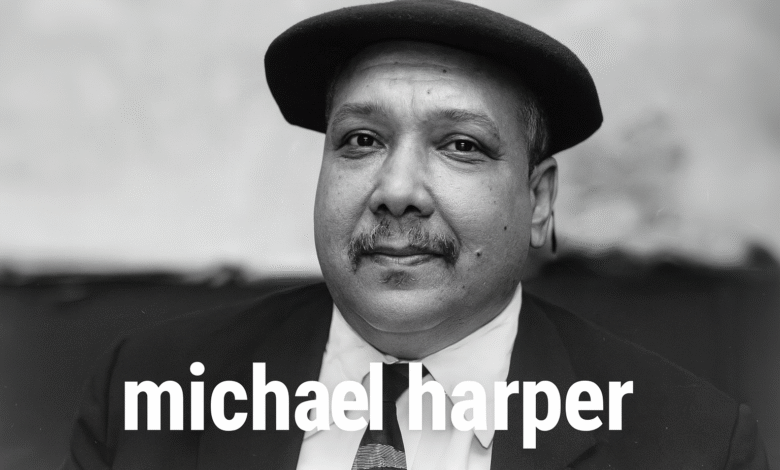Michael Harper: The Rhythmic Voice of Black America
Exploring the Life, Legacy, and Literary Brilliance of an Iconic African-American Poet

Introduction
Michael Harper was more than a poet—he was a resonant voice echoing the struggles, dreams, and musical soul of Black America. Famed for his integration of jazz rhythm and African-American history into modern verse, Harper’s literary achievements carved a distinct place in American literature. His works were steeped in cultural memory, loss, music, and Black identity, transforming his poetry into living history.
Born in Brooklyn and raised in Los Angeles, Harper’s path from postal worker to acclaimed poet and professor was marked by intellectual rigor and emotional depth. His influence extended far beyond the classroom, as he mentored countless students and redefined poetic expression through improvisational form and historical consciousness
Quick Bio
| Attribute | Details |
|---|---|
| Full Name | Michael Steven Harper |
| Date of Birth | March 18, 1938 |
| Place of Birth | Brooklyn, New York, U.S. |
| Date of Death | May 7, 2016 |
| Nationality | American |
| Ethnicity | African-American |
| Education | CSU Los Angeles, University of Iowa (MFA) |
| Profession | Poet, Educator |
| Famous Works | Dear John, Dear Coltrane, Images of Kin |
| Family | Spouse: Shirley Buffington (div.), Children: 3 |
| Known For | Jazz-infused poetry, cultural themes |
Early Life and Formative Years
Michael Steven Harper was born on March 18, 1938, in Brooklyn, New York, to Walter and Katherine Harper. His early life was shaped by the stories and sounds of African-American life, with music—particularly jazz—becoming an early and lifelong influence. At the age of thirteen, his family relocated to Los Angeles, where he attended Dorsey High School.
He initially pursued pre-medical studies at Los Angeles City College before switching to literature. Harper’s passion for language and social consciousness eventually led him to California State University, Los Angeles, where he earned both his BA and MA. His journey continued at the prestigious Iowa Writers’ Workshop, where he became the only African-American student in his MFA cohort.
Education and Literary Awakening
Harper’s time at the Iowa Writers’ Workshop in the early 1960s was pivotal. Immersed in an environment of intense literary scrutiny, he refined his voice while embracing the improvisational rhythm of jazz in his poetry. Harper rejected traditional constraints, opting for a style that mirrored the syncopation and unpredictability of the music he loved.
In addition to literature, he studied history and Black culture, drawing from both to craft deeply layered verse. The fusion of intellectual discipline and emotional resonance became Harper’s signature. He once described poetry as “a call to memory,” and this belief was evident throughout his career.
Career Beginnings and Teaching Journey
Harper’s professional career began with teaching roles at Contra Costa College and Lewis & Clark College. In 1970, he joined the faculty at Brown University, where he would remain for more than four decades. At Brown, Harper was not only a professor of English and literary arts but also a guiding force for young writers.
He chaired the university’s MFA program and inspired generations of poets. Known for his dynamic teaching and high standards, Harper instilled a sense of cultural pride and intellectual rigor in his students. His legacy as an educator is matched only by his literary accomplishments.
Major Literary Works and Recognition
Harper’s first collection, Dear John, Dear Coltrane (1970), was a poetic tribute to the legendary jazz saxophonist John Coltrane and marked his emergence as a literary voice of significance. The collection was nominated for the National Book Award and established his rhythmic, improvisational style.
Following this, he published History Is Your Own Heartbeat, Nightmare Begins Responsibility, and Images of Kin—the latter becoming a finalist for the National Book Award and winner of the Melville-Cane Award. These works explored themes of ancestry, personal loss, social justice, and the cultural experience of African-Americans.
Style, Themes, and Influence
Harper’s poetry is best understood as a synthesis of personal history, African-American heritage, and music. He often employed free verse structures that mimicked the rhythms of jazz, blues, and gospel. Through this form, he conveyed emotional intensity and cultural narratives that might otherwise remain unspoken.
Central to Harper’s work was the concept of kinship—both familial and cultural. His writing touched on the trauma of stillborn children, the resonance of slave history, and the ongoing struggle for Black identity in America. He gave poetic form to history, rendering it intimate, urgent, and alive.
Public Recognition and Honors
In 1988, Harper was appointed as the first Poet Laureate of Rhode Island, a testament to his influence on regional and national literature. Over his lifetime, he received numerous awards, including the Frost Medal for lifetime achievement, a Guggenheim Fellowship, and several National Endowment for the Arts grants.
His peers and students revered him for his wisdom, and his works became staples in university curricula across the country. Harper also served as a judge for major poetry awards and edited several anthologies that showcased the diversity of African-American poetic voices.
Personal Life and Family
Michael Harper married Shirley Ann Buffington in 1965, and they had three children together—Roland, Patrice, and Rachel. Two other children died at birth, a tragedy that deeply influenced his poetry. His daughter Rachel Harper later became a published writer herself, carrying forward his literary legacy.
Though the marriage ended in divorce in 1998, family remained a central theme in Harper’s life and writing. His parents, particularly his mother, instilled in him a love of literature and heritage, which he honored through his teaching and poems.
Final Years and Legacy
Michael Harper retired from Brown University in 2013, concluding a distinguished teaching career that spanned more than forty years. He passed away on May 7, 2016, in Providence, Rhode Island. Even after his death, his poetry continues to inspire scholars, poets, and educators.
In 2024, Brown Alumni Magazine published a special feature titled “Understanding Michael S. Harper,” offering scholarly insights into his poetic legacy. His voice—resonant with cultural truth, pain, and pride—remains a powerful influence in American letters.
Conclusion
Michael Harper’s poetry stands as a bridge between generations, communities, and histories. Through his distinctive blend of rhythm, memory, and truth, he crafted a body of work that remains both timeless and deeply relevant. As an educator, he nurtured voices. As a poet, he amplified them.
In honoring Michael Harper, we remember a literary giant who used verse not just to describe the world, but to shape it—note by note, word by word.
❓ Frequently Asked Questions
Q1: What is Michael Harper best known for?
He is best known for his jazz-influenced poetry and for being a leading African-American voice in modern American literature.
Q2: What are some of his most famous books?
Key works include Dear John, Dear Coltrane, Images of Kin, and Songlines in Michaeltree.
Q3: Was Michael Harper involved in teaching?
Yes, he taught at Brown University for over 40 years and chaired the MFA program.
Q4: How did his personal life influence his poetry?
The loss of two of his children and his deep connection to African-American heritage profoundly shaped his poetic themes.
Q5: What is his poetic style known for?
Harper’s style is known for its rhythmic flow inspired by jazz and its exploration of Black identity, history, and family



